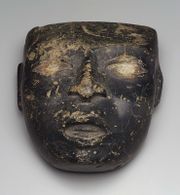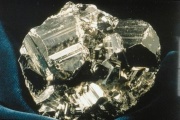Difference between revisions of "Pyrite"
Jump to navigation
Jump to search
| Line 12: | Line 12: | ||
== Risks == | == Risks == | ||
| − | Can evolve low levels of sulfur dioxide. | + | * Can evolve low levels of sulfur dioxide. |
| − | + | * Degrades in high humidity environments. | |
| − | Degrades in high humidity environments. | ||
==Resources and Citations== | ==Resources and Citations== | ||
Revision as of 13:20, 23 October 2022
Description
General name for any metal sulfide mineral. The name pyrite is also commonly used for one mineral form of Iron disulfide. Other types of pyrite include the sulfide salts of arsenic (Mispickel), copper (Chalcopyrite), cobalt (Smaltite) and tin. Ethanolamine thioglycollate treatments have been used to minimize the decomposition of pyritic specimens (Cornish 1984).
See also Pyrrhotite.
Synonyms and Related Terms
Fool's gold; iron disulfide; mundic; andodamus (Pliny); Pyrit (Deut.); pirita (Esp.); pyrite (Fr.); pyriet (Ned.); piryt (Pol.); pirite (Port.)
Risks
- Can evolve low levels of sulfur dioxide.
- Degrades in high humidity environments.
Resources and Citations
- L. Cornish, A.M. Doyle. "Use of Ethanolamine Thioglycollate in the Conservation of Pyritised Fossils" Palaeontology 27(2), 1984, 421-424.
- G.S.Brady, Materials Handbook, McGraw-Hill Book Co., New York, 1971 Comment: p. 422
- Susan E. Schur, Conservation Terminology: A review of Past & Current Nomenclature of Materials, Technology and Conservation, Spring (p.34-39); Summer (p.35-38); Fall (p.25-36), 1985
- Jack Odgen, Jewellery of the Ancient World, Rizzoli International Publications Inc., New York City, 1982
- Pam Hatchfield, Pollutants in the Museum Environment, Archetype Press, London, 2002

